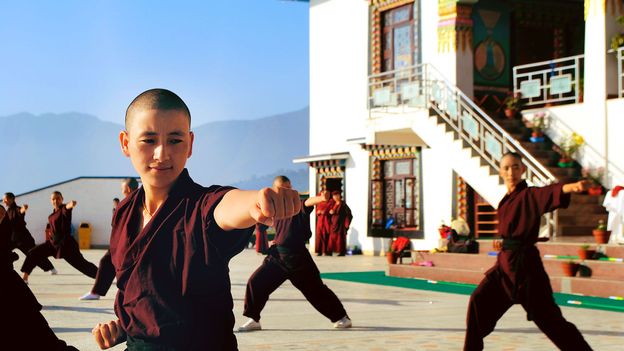Trekking for hours in the thin air of the Himalayas, hundreds of maroon-robed Buddhist nuns are carrying vital aid – and health advice – to villagers left destitute and sick by COVID-19.
Nicknamed the “Kung Fu nuns” because they train in martial arts, the women come from the Drukpa lineage – the only female order in the Buddhist monastic system where nuns have equal status to monks.
Besides hauling sacks of staples from rice and lentils to toiletries and face masks on their backs in the harsh mountain conditions, the nuns have been urging villagers to heed the threat posed by COVID-19.
“The biggest challenge has been explaining to people how dangerous this virus is,” Jigme Konchok Lhamo, 28, said about COVID-19, which has killed about 1.57 million people worldwide.
“People do not take it seriously nor the precautions seriously,” she told the Thomson Reuters Foundation from Nepal’s capital, Kathmandu, via video call.

A Kung Fu nun hands a woman face masks. Thomson Reuters Foundation/Handout by Live to Love International
The villages receiving aid from the nuns lie on both sides of the India-Nepal border, and some 2,000 poor families have been supported so far.
Without regular access to television or the internet for information, the nuns said locals often dismiss the virus as “just a cold”, and shrug off their training sessions on social distancing, hand washing and how to wear masks.
In recent days, the nuns have been working round-the-clock to get food and hygiene items to a COVID-19-hit village in the mountainous Indian district of Lahaul, which is home to half of the global network of about 700 Drukpa nuns.
All of the village’s inhabitants have caught the virus, including some of the nuns’ own relatives.
“We are scared … But fear can’t stop us,” said Jigme Yeshe Lhamo, 30.
“We can’t change the whole world by ourselves but even if we manage to help one life, that’s a big success. We feel happy about it. We feel encouraged,” she said.

Villagers line up to receive aid from the Kung Fu nuns. Thomson Reuters Foundation/Handout by Live to Love International
PASSION TO HELP
Traditionally, nuns are expected to cook and clean and are not permitted to exercise. But this changed about a decade ago when the leader of the 1,000-year-old sect, His Holiness The Gyalwang Drukpa, encouraged the nuns to learn Kung Fu.
“They are a new generation of women who are not afraid to break century old taboos and stereotypes,” said Carrie Lee, a volunteer and former president of Live to Love International charity that supports the Drukpa nuns.
“They took their practice off the meditation cushion and into the world – often times against criticism and threats to their safety.”
When the pandemic took hold, the nuns started working with their families in Ladakh – a remote Buddhist ex-kingdom in the Indian Himalayas – to sew masks for villagers.
They have been enlisting support from others too.

Kung Fu nuns and local volunteers trek to Himalayan villages to deliver face masks. Thomson Reuters Foundation/Handout by Live to Love International
Nima Sherpa, a 28-year-old woman from northern Nepal, credits the nuns for her passion to help others. She bought essential items for 100 families when the nuns needed help with their distribution drives.
Nima, who like most Sherpa goes by her first name, said working on the ground opened her eyes to the kind of hardships villagers were facing as job losses left many unable to pay for groceries or utility bills.
Many of the mountain villagers work in road-building and construction, which came to a standstill due to lockdown curbs – decimating household incomes.
With schools shut and online classes now the norm, many children have been forced to miss a year of education without access to laptops or the internet.
For women, the pandemic has brought additional challenges.
“When I spoke to my cousin, she said maintaining menstrual hygiene was very difficult because sanitary pads are not available and even if they are, they don’t have enough money to purchase them,” Nima said.
The nuns said their next campaigns would focus on women’s health, including menstrual hygiene and teaching villagers how to do breast self-examinations to help detect signs of cancer.
“We will not only teach about coronavirus precautions but also provide sanitary pads,” Yeshe said.
“It’s a very big issue for women.
Feature Image : Google Images

